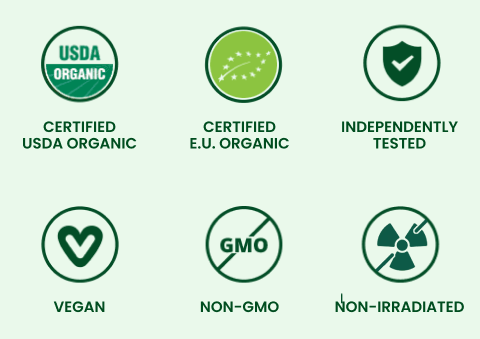When it comes to nutrition and superfoods, it can all be a little overwhelming - even for a health nut! There's always a new "miracle" product being marketed that promises to do wonderful things for your well-being and body. But, behind all the noise lies the reality - the fundamentals of good nutrition never change. To build a strong and healthy body, we need protein from lean meats, legumes and would you believe it, superfoods. That's right. Your favorite superfoods like moringa contain plant-based protein that can help you build lean muscle and keep your body strong.
We get asked about it all the time. People want to know, for real, how much protein in moringa powder is there, and is it actually worth your time? We dug in, and the answers might shock you. Here’s a straightforward look at what makes this green powder a legitimate protein contender.
1. First Off, It Genuinely Packs a Protein Punch
Most greens are nutritional heroes, but protein isn't usually their main superpower. This is where moringa shines. Moringa powder can have between 24 to 27 grams of protein per 100 grams.
Let that sink in. That’s a number you’d expect to see on a tub of Greek yogurt or cottage cheese, not from a humble leaf. Of course, you’re not eating 100 grams at once, but adding a tablespoon to your meal can tack on an extra 2-3 grams of high-quality protein without you even noticing. And those little additions add up fast over a week!
2. But It's the Type of Protein That Really Matters
Here's the part that got our attention. It’s not just about the amount of protein but the quality. Protein needs to provide all 9 essential amino acids to be truly useful. These are the building blocks our bodies can't make on their own. It’s like trying to build something with an incomplete toolkit if even one is missing.
Most plant proteins are incomplete. You have to combine them (like rice and beans) to get the full benefit. Moringa, amazingly, has them all. It’s a complete protein. That’s a huge deal for a single plant source, putting it in a league of it's own.
3. Your Body Actually Knows What to Do With It
Ever hear the saying, "You are what you eat"? Protein on a nutrition label doesn't mean much if your body struggles to digest it. Some plant-based proteins are notoriously hard for our systems to break down and use.
Moringa, thankfully, is known for being easy on the digestive system. Its protein is highly bioavailable, meaning your body can absorb and put those amino acids to work right away for everything from repairing muscle to supporting your immune system.
4. It’s a Team Player
Another thing we love about moringa is that the protein doesn't work alone. It arrives as part of a package deal, loaded with other nutrients that act as a support crew.
Think of its high Vitamin C content, which is crucial for keeping your connective tissues strong. Or its impressive amount of iron, which helps carry oxygen to your muscles and fight off fatigue. These co-factors help your body get the most out of the protein you're giving it.
5. Making It Work in a Real Kitchen
So, it's nutritious. But what about actually using it? Let's talk about the taste. It's... green. Earthy, a bit like spinach with a hint of the grassy notes you find in matcha tea.
Because of this, it works best with other ingredients. Moringa powder blends perfectly into a fruit smoothie, a hearty soup or even salad dressing, and can even be whisked into scrambled eggs. Don't enjoy the taste even by trying to trick your tatse buds? Opt for moringa capsules for a tasteless and convenient daily dose!
So, what's our final take? Moringa isn't a replacement for a steak dinner, but that's not its job. It's a nutritional multi-tasker - an easy, plant-based way to add high-quality, complete protein and a host of other benefits to the food you're already eating.


